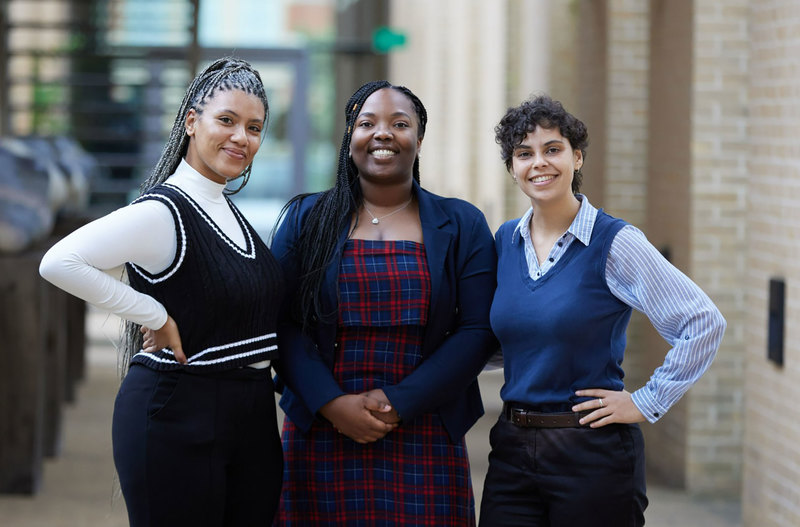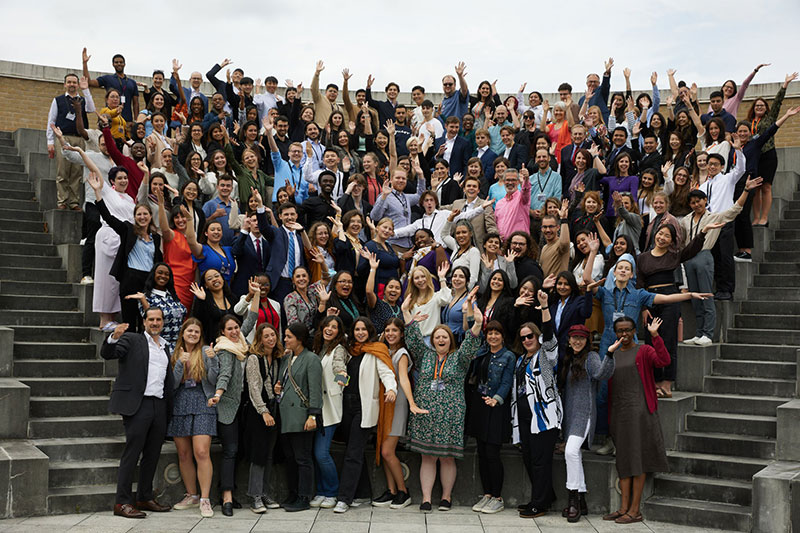UCT team wins Oxford Map the System competition
01 July 2022 | Story Nicole Forrest. Photos Supplied. Voice Cwenga Koyana. Read time 8 min.
Following their win at the regional final hosted by the University of Cape Town Graduate School of Business (UCT GSB), Finclusive was awarded first place for their project at the University of Oxford’s (UO) Map the System (MTS) competition, which took place from 17 to 20 June.
Development finance master’s students Janine Rutsch, Lauren Fray and Makha Baloyi went head to head with teams from 64 international universities at UO’s Saïd Business School’s Skoll Centre for Social Entrepreneurship. Their project, which focused on home ownership for South Africa’s “missing middle”, saw Finclusive take the top spot in the competition.
Housing the missing middle
Map the System was launched by the Skoll Centre for Social Entrepreneurship in 2015. Since then, it has sought to change conversations around and approaches to social impact education. The competition attracts students from across the globe and challenges them to devise holistic solutions that can drive social and environmental change.
With evidence indicating that property ownership is one of the most effective ways to promote upward mobility and inclusion, as well as the massive potential social and economic impact this could have in South Africa, the women of Finclusive chose to hone in on mortgage financing for South Africans earning approximately R25 000 or less per month.
“The missing middle is nearly 30% of South African households. We all have close family members, friends and colleagues who are affected by it,” said Rutsch about the team’s inspiration for their study.
Home ownership equates to improvements with many other social factors, such as better healthcare, better education, access to transport and opportunities. As such, Fray noted, including the missing middle in the home ownership market could provide “access to more opportunities as well as wealth accumulation and upward mobility”.

Here, the solution lies in encouraging public–private partnerships and encouraging greater transparency within the mortgage lending market to reduce the perceived risk of lending to the missing middle.
According to Baloyi, the project is aimed at developing financial instruments and funds that have the ability to reduce the perceived risk of lending to individuals in this gap market. “When that perception changes,” she noted, “it can influence the traditional banks to charge lower interest rates and so provide even greater access.”
The roadmap to victory
The project resulted in solutions-based strategies that could move South Africa’s missing middle towards home ownership, but Finclusive was actually born out of the team’s desire to make the most of their final year of studies.
“As a study group, we’d spoken about the fact that we wanted to use our last year of being students to do something extra and enjoy the experience beyond meeting the requirements of our course,” Rutsch explained.
While the prospect of solving an issue with wide-reaching social and economic impact in a sustainable way was exciting, the team acknowledged that it took plenty of dedication to formulate a winning system while keeping up with their coursework and personal lives.
“We all had school assignments, we had work assignments, then we had MTS and we had our own personal issues in between all of that,” said Fray. “It’s been quite a journey for us. I feel as though we’ve come out of this as new people; new people who can juggle all of these things confidently.”
“We were determined to learn new skills and apply them to a real problem in South Africa.”
Despite the challenges and their initial lack of familiarity with systems thinking, Finclusive persevered. They used an iterative approach to identify levers of change that could effectively drive transformation in South Africa’s home ownership market.
“We would spend weekends on campus with a big whiteboard trying to map out the system. Those initial iterations are worlds away from what we have now, but we definitely did get to explore the system together,” said Rutsch.
“At each stage of the competition we always felt like the underdogs given our limited experience with systems thinking. So, while we celebrated each progression to the next stage, it was never about that for us. We were determined to learn new skills and apply them to a real problem in South Africa. We were in it for the process itself and winning was just the cherry on top,” added Baloyi.
“In terms of the work involved, I think we only fully grasped what was expected after the regional round. Our final presentation differed quite a bit from our first, because we learned and applied the systems thinking tools more effectively.”
Navigating new-found success
The title and £4 000 (approximately R79 000) prize money for winning MTS are certainly a boon for the project and team. However, the women of Finclusive highlight that the opportunity to be exposed to and interact with other systems thinkers was a victory in itself.
“Quite often, what I really valued about this competition was that I was exposed to the way people approach problems in a way that I’ve never been with my coursework,” said Fray.
“I’d had no idea what systems thinking was. Going into this whole competition was a learning curve, but it’s been great because I’ve realised that it’s something I’m very much interested in. Specifically in the context of sub-Saharan Africa, where trying to come up with solutions can be deflating because there are all sorts of players who don’t necessarily want to act,” Baloyi noted.
Agreeing with this, Rutsch added: “We’ve also learnt that perspective is so important. When you are able to look at a problem objectively and see the value of your work within a system, it gives you the confidence to do more with your work.”
While Baloyi, Fray and Rutsch all still plan to follow different careers, they are excited about the opportunity that winning MTS creates for furthering the issue of mortgage lending to South Africa’s missing middle.
“We have identified some interesting further education courses and centres around the world that we’d love to interact with,” said Rutsch. “There are also parties that have approached us and want to learn about how to influence the system to provide housing for more people in South Africa.
“We are so excited to sit … and figure out what we can do to have the most impact on the system and create change. We’re really keen to consult with the organisations we’ve interviewed and the people who provided resources for us to execute the project; to figure out the way forward.”
Making UCT proud
Rowan Spazzoli, a lecturer and programme coordinator at the Bertha Centre, said that Finclusive’s learning-first to the competition is what set them apart from other teams. “They never went with the objective of winning. Their aim was always to understand the issue of mortgage lending and how that affects South Africans.
“With that attitude, they embodied what the competition is about, the vision and objectives of the Bertha Centre, and represented UCT in the best light. We can’t wait to see what is next in store for the team.”
 This work is licensed under a Creative Commons Attribution-NoDerivatives 4.0 International License.
This work is licensed under a Creative Commons Attribution-NoDerivatives 4.0 International License.
Please view the republishing articles page for more information.










